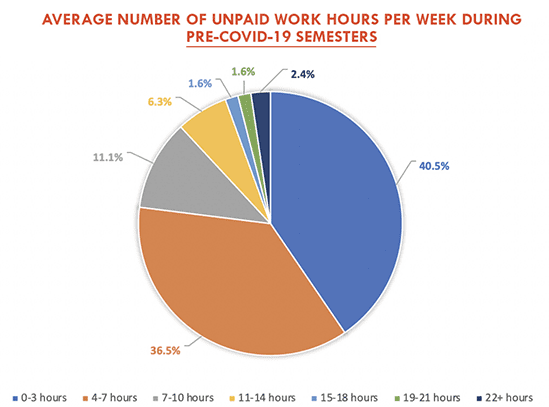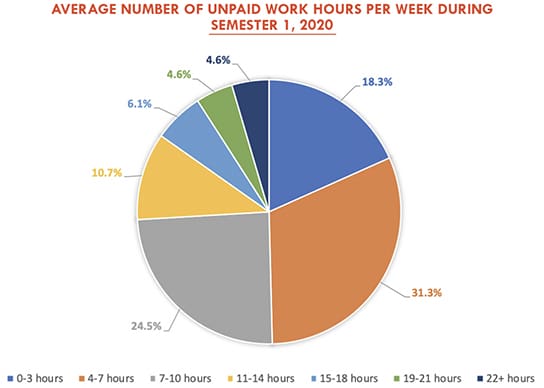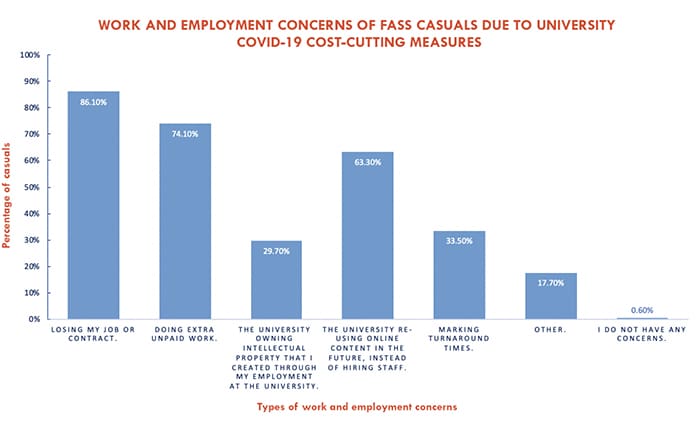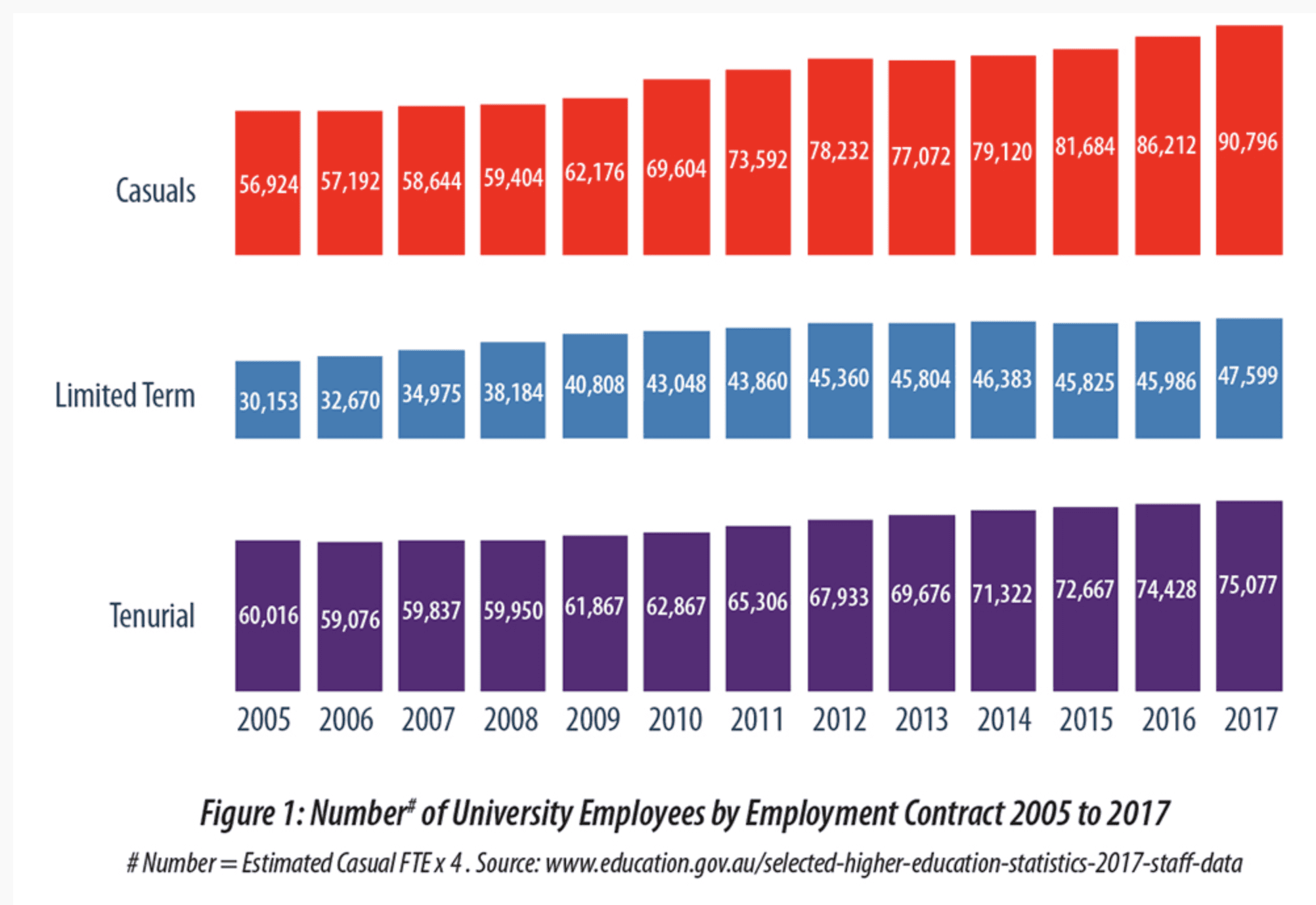A survey of casual academics in the Faculty of Arts and Social Sciences, conducted by the University of Sydney Casuals Network, has found that casual academics have been systematically underpaid during the pandemic.
Casual staff reported working an average of 50 unpaid hours since the beginning of the pandemic.
However, the underpaying of casuals predates coronavirus, the survey finds. 60% of casuals stated they had worked more than three hours of unpaid work prior to coronavirus, increasing to 82% of casuals during the pandemic.
One survey respondent stated they had been paid only $8 an hour for the hours they worked.


These rates of underpayment are higher than those found in a similar survey conducted at UNSW, where 42% of casuals reported working unpaid hours during the pandemic.
“This needs to be challenged. At other universities like UNSW, they have seen the writing on the wall and settled out of court,” survey co-author, Joel Griggs, told an open meeting of casuals today.
UNSW is currently conducting a review into underpayment of staff within its Business School, while the National Tertiary Education Union is in discussions with the University of Melbourne about underpayment of staff there.
“We’re very interested in the developments happening on this issue at other universities,” Robert Boncardo of the USyd Casuals Network told Honi.
The survey indicates that the University has failed to compensate staff for the increased workloads created by the transition to online learning.
46% of casuals stated they had seen a “significant increase” in work due to coronavirus. Respondents pointed to the time spent transferring units online and administrative work as the cause of the increased work hours.
Specifically, respondents stated that the pandemic had caused them to spend more time supporting distressed students, marking individual assessments instead of group assignments, providing alternatives for students who couldn’t use Zoom, meeting with students outside of class times to provide academic support, and meeting with other staff to discuss the transition.
Unlike universities like UTS and UNSW, staff at USyd were given no time off classes to assist the transition to online learning.
84.9% of respondents also stated they had incurred additional costs in the shift to online learning, paying for increased internet and technological costs. The University has refused to compensate academics for these costs.
Underpayment and employment precarity has had a psychological toll on casual staff.
99% of respondents stated they had work and employment concerns, with 77% of respondents stated they feared losing their job.
60% stated that if they were to lose their current job at the University, they would likely leave academia permanently.


The finding reflects the possibility of an exodus of early-career academics from the University, across faculties.
In a recent study which surveyed more than a thousand PhD students at the University of Sydney, 45% of respondents stated that they had been pushed beyond their financial capacities and expected to be forced to disengage from their research within six months.
5% stated they were currently or about to experience homelessness, and 11% stated they had skipped meals.
The study has been submitted to the journal Research in Higher Education; it has not yet been peer reviewed.
“Because so many HDR students are also casual researchers and tutor at the University, we are really looking at the same group of people,” Boncardo says.
“With cuts to casual work we anticipate to see more homelessness, more people not being able to afford meals and more people leaving academia.”
“We welcome and appreciate the valuable data in this survey which will support our external advocacy efforts and inform our internal planning for student support,” a University spokesperson told Honi Soit.
“We know that students have been experiencing both academic and non-academic disruption during this global pandemic. The safety and wellbeing of all our students is our highest priority and we are keen to continue to support both their educational progress and their wellbeing, with minimal disruption.”
The spokesperson also stated that HDR students have been given an extension of one research period, with fees for international students being waived for the additional period. Small bursaries of $2000 remain available for students in financial distress.
The SRC and SUPRA have been given additional funding for legal support services, but have seen overall funding cuts from last year.
The findings of the survey are particularly alarming given the heavy reliance on casual academics in the Australian university sector.
A 2018 report by the National Tertiary Education Union, found that the number of Full Time Equivalent casual staff at Australian universities had increased 60% from 2005 to 2017. 35% of Australian university staff do not have a secure job.
At some universities, as much as 80% of undergraduate teaching is done by casual academics, and there are fewer paths from casual positions to permanent ones. 12.6% of survey respondents reported having been a casual for more than 10 years.

“Universities across Australia have used a growing international student market to fund flashy buildings that can act as advertisements for new students,” Boncardo tells Honi.
“Universities have refused to invest in teaching staff, and so as student numbers have grown they have turned to casualisation of the academic workplace, as opposed to investing in permanent positions.”
“Labour has become something that corporate universities have been able to cut or grow as needed easily, creating an increasingly precarious workforce,” he says.
Casual staff have argued that they should not bear the brunt of the revenue loss, and that cuts to casuals will not solve the University’s revenue problem.
In an open meeting with casuals last month, management divulged that the Faculty of Arts and Social Sciences expected to save only $1,027,000 from cuts to casual staff and courses next semester, less than 0.22% of the $470 million revenue loss the University expects.
Dean of Arts, Anna-Marie Jagose defended the decision to “judiciously drop some units of study” as “a fairly moderate approach” which “shouldn’t be made synonymous with sacking casuals.” In the meeting however, Jagose admitted that “there will be less casuals employed next semester.”
“Is it really so hard for management to find other savings measures to cover the relatively small sum of $1,027,000? Is there really not a single executive salary that can be cut, no patronising ‘wellness’ program that can be scaled back?” a response to management published by the Casuals Network asks.
14% of survey respondents stated they had already been told they would not have work in Semester 2. Because this data was collected before the full suite of Arts course cuts were announced, this likely underestimates the number of casual academics out of work next semester.
The report recommends that instead of pursuing cuts to casual staff, the University should review the salaries of high paid executive staff. Vice Chancellor Michael Spence has stated that approximately 320 staff at the University were paid more than $250,000 a year.
Spence was paid more than $1.5 million last year, the Sydney Morning Herald reports, up 60% from five years ago.
Since the beginning of the pandemic, almost three quarters of Australian Vice Chancellors have committed to pay cuts. A University spokesperson has told Honi Soit, however, that a cut to Spence’s pay was not being considered.
Following a commitment to take a 20% pay cut by University of Melbourne’s Vice Chancellor, it appears Spence is the most highly paid Vice Chancellor in Australia.
The University’s executive will not be taking pay increases this year.
“We have had to adapt rapidly to ever-changing circumstances during this global pandemic and we understand that it is a stressful time for all our staff, including our valuable casual employees,” a University spokesperson told Honi.
“As part of the response to our projected $470 million budget shortfall this year due to COVID-19 and its impact on student numbers we have asked managers to look at the best way to manage all workloads during this period and beyond.
“In order to responsibly manage the financial impact of this crisis, the decline in enrolments has led to a small reduction in units on offer and classes to teach.”
The University has declined to comment on allegations of systemic underpayment, or the report’s recommendation to consider higher paid executive staff pay cuts rather than casual staff cuts.
Casuals however, are determined to keep fighting staff cuts.
“It is difficult to organise casual staff,” Boncardo tells Honi. “They often start from a place of isolation, only knowing the person who hired them and not being properly included in the intellectual life of the University.”
“However we’ve found that, once engaged, they are energetic and principled. This is a generation of workers who have not had the luxury of stable employment, and feel no need to defend the status quo.”
“The Casuals Network has proven that we’re out in front of permanent staff in many ways, because we’re not under the same political pressure that permanent staff may be with committee work or seeking promotions,” Boncardo says.
“We’re willing to have these difficult conversations, because we’re so far outside of the game.”
Despite the reports findings of widespread exploitation, casuals will continue to work these jobs.
“I want to be very clear,” Boncardo says, “we are asking to keep our exploitative jobs.”
“We will keep fighting until all staff and all courses are reinstated.”
The full report, Overworked and Worked Over: Casual Academics Bear the Costs of COVID-19 by N. Batten, L.A. Nicolls, J. L. Griggs can be found on the University of Sydney Casuals Network website.
Editor’s note: This article has been updated to include University comment received after the time of publication.





